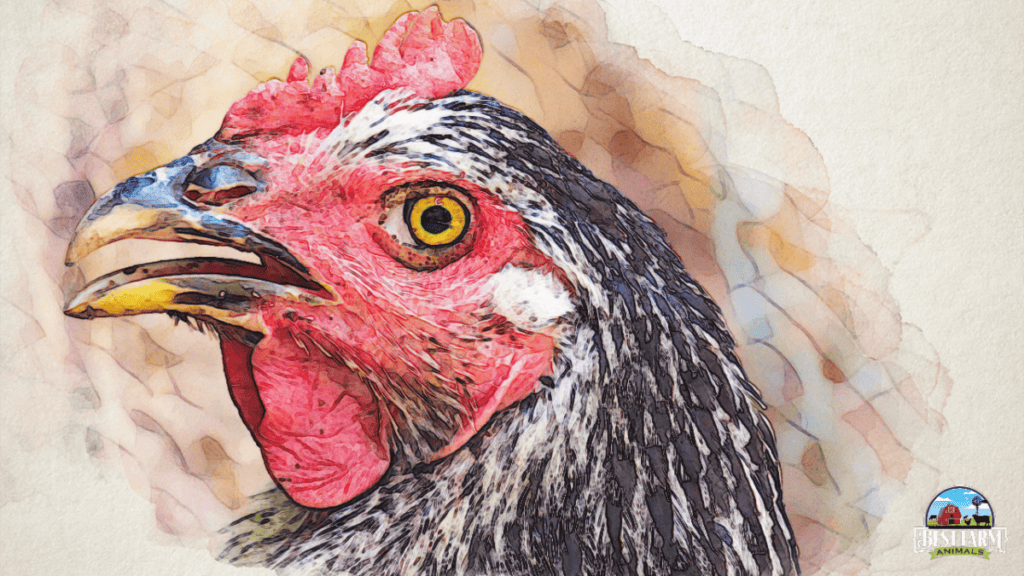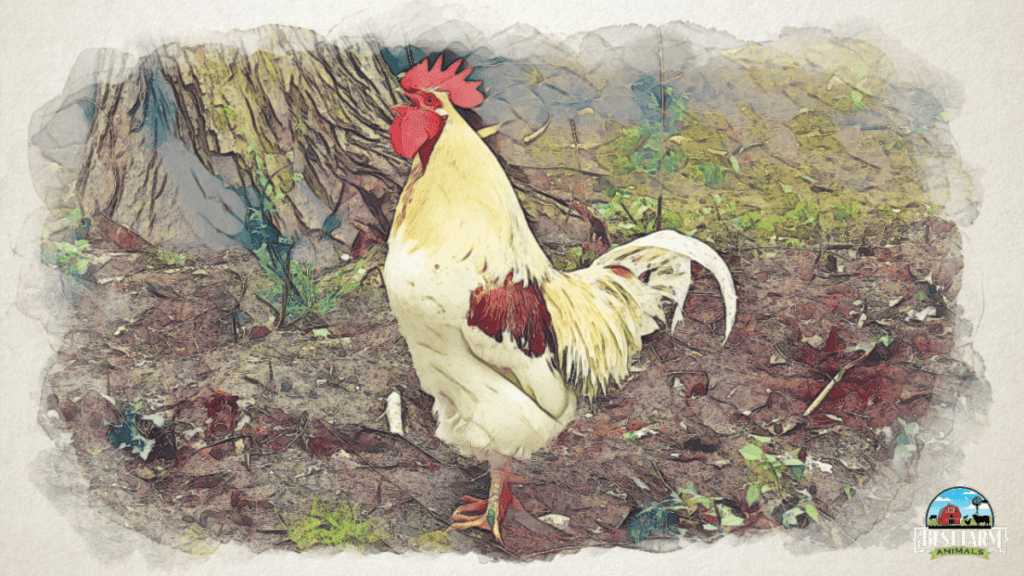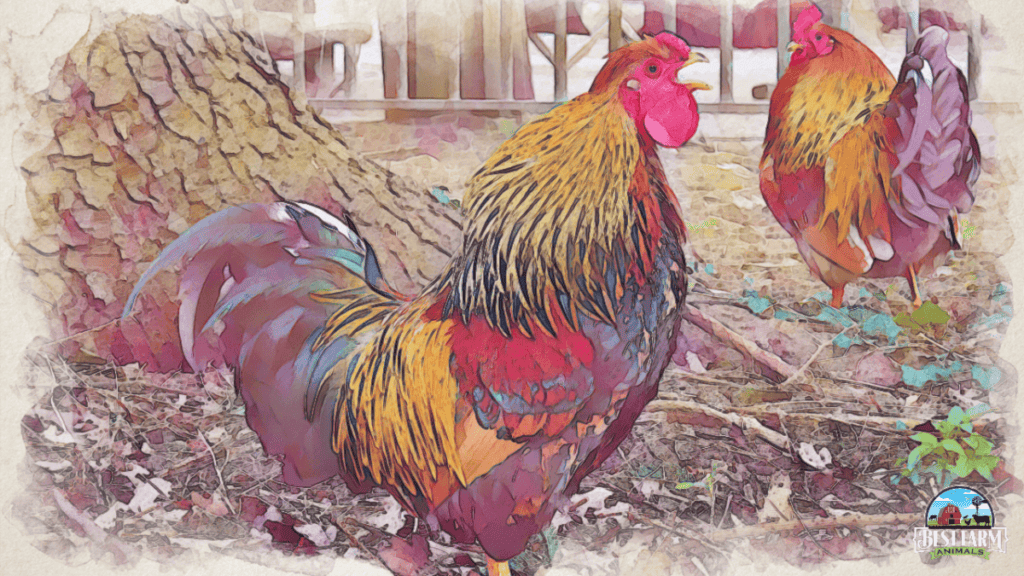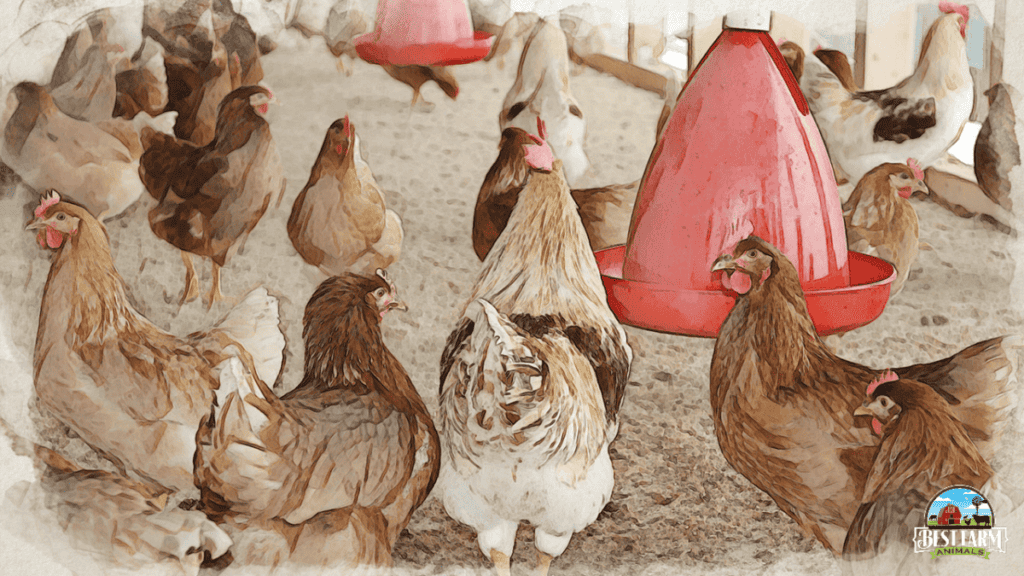Yesterday, my daughter ran in the house frantic because her chicken was panting and seemed lethargic. When I went to check, we realized that several of the hens were panting, and I was able to determine the issue.
Why is my chicken panting?
The most common reason behind a panting chicken is heat stress. Chickens pant to keep their bodies cool, especially when the temperature rises to over 80 degrees Fahrenheit. Although chickens start panting at 80 degrees F., they aren’t stressed until the temps rise into the high 90s when chickens can start to become dangerously overheated.
Chickens can’t sweat. To cool down, they have to pant like a dog. However, this behavior, where their beaks open and their wings are spread away from their bodies, is not only caused by heat stress. In this article I’ll cover why you chickens pant and when it becomes dangerous.
Contents
Normal Panting Chicken vs. Wheezing Chicken
If the chicken is panting excessively and lies limply with their wings out, it is in danger of heat stress. Heat-stressed chickens pant much harder than a normal warm-weather panting behavior. Regular panting is normal for a chicken as it’s how the chicken lowers its body temperature.
If your chicken is panting from illness, it will sound more like a wheezing sound with congestion or mucus. The wheezing will be weak and irregular, with other accompanying symptoms such as sneezing, coughing, mucus discharge, and tremors.
Chicken Pants With Mouth Open Because of Heat
Chickens that are hot pant heavily with their mouths open, have rapid breathing, have a pale wattles and comb, and only like to lay down. Their chicken wings are also held out to the sides with feathers pinned up.
Moreover, heat-stressed chickens only drink water and do not eat, which also causes chickens diarrhea from overconsumption of water and leads to dehydration. At the same time, hens that have heat stress don’t produce egg that much.
Chickens don’t sweat, so they have no effective way to cool their bodies other than lying in the shade, spreading their wings, and gasping or panting. With all those feathers, chickens quickly overheat. As soon as their body temperature reaches critical levels, the chicken can easily suffer a stroke or heart failure.
To prevent your chickens from being heat-stressed, first, provide a cold water. Add ice to water bowls if the weather is extremely hot. Second, don’t overcrowd chicken coops. Broiler chickens in battery cages frequently die from heat stress if they are not cooled sufficiently.
If you can’t move the chickens into a larger space, add fans or air conditioning systems to poorly ventilated coops. Always ensure the chickens have shady spots to hang out and cool down. Lastly, use misters to help reduce the temperature around the coop.
In extreme cases, submerging a heat-stressed chicken up to its neck in cold water with ice may be necessary.

Signs of a Heat-Stressed Chicken
- Heavily panting and rapid breathing
- Wattles and pale comb
- Wings held out to sides with feathers pinned up
- Lying listless and not grazing about
- Only drinking water and not eating
- Diarrhea from extra water consumption that leads to dehydration
- No further egg production
How to Prevent Chicken From Getting Heat-Stressed
- Add ice to water bowls if the weather is hot
- Don’t overcrowd chicken coops
- Add fans or air conditioning systems to coops
- Place shady spots for chickens to hang out and cool down
- Use misters to help reduce the temperature around the coop
Treat heat stress quickly, as it can lead to heat stroke, which is often fatal to chickens. A chicken that pants and then suddenly dies has probably shown several signs of heat stress and suffers organ failure due to its excessively high body temperature.

Chickens Can Overheat in Coops With Poor Air Ventilation
If chickens are closed in a coop with poor ventilation, the chances of overheating is higher and they also breathe with difficulty. Panting and heavy breathing may be symptoms of poor air quality affecting the chickens.
My cousin suffers from asthma, and when she enters a place that’s closed up with poor circulation, like the little library in her hometown, her lungs close like clam shells. Some chickens are the same.
If your chicken breathes heavily the minute they enter their coop or shed but breathe fine when outside in the yard or in the run, you have a ventilation problem.
Another sign a chicken is overheating due to poor ventilation is when your chicken sneezes in the coop or has a mucus discharge from their eyes or nose in the morning. This means, it may be suffering with allergies that can lead to heavy breathing.
To solve ventilation problems inside a chicken coop, provide more ventilation by using a fan. Adding an extractor fan, or cutting more windows in the side of a shed can also help to fix this problem. Covering the chicken coop with mesh is better than using solid wood or steel. You can also move the coop to a shady area, as a cool coop will offer better air quality.
Moreover, clean the coop frequently to remove allergy-causing material like manure, dust, and dander. You must also thin your flock as an overcrowded coop will cause breathing difficulties for your chickens. Having another coop is a good idea, so there’s ample space for your chickens.

Signs of Ventilation-Related Breathing Problems
- Chicken starts breathing heavily as soon as they go in the coop.
- Sneezing in the coop
- Mucus discharge from their eyes or nose in the morning
How to Fix Poor Ventilation Problems Inside Chicken Coops
- Provide more ventilation by using a fan
- Cut more windows in the side of a shed
- Cover chicken coop with mesh instead of solid wood or steel
- Move the coop to a shady area
- Clean the coop frequently
- Thin your flock
- Invest in another coop.
Chickens have sensitive lungs and easily suffer respiratory distress when confined in areas where mites, dust, and dander can enter their lungs.
Keep Your Chickens Cool In Hot Temperatures
During the summer, your flock always needs access to clean water, shade, and room to move away from other chickens to cool down. Check out how to care for chickens during hot temperatures for a complete list of caring for over-heated chickens.
How To Help Your Panting Chicken
You may panic when you notice your chicken walking about panting or with their beak openr. After all, nobody wants their chickens to suffer. It’s important to take instant action, and this is how:
Calmly catch the chicken, folding its wings down the side of its body, and keeping it as calm as possible.
Feel the overall warmth of the chicken. If it is very hot, you are probably dealing with heat stress that’s about to transition to heat stroke.
Move the chicken to water and shade. Move your chicken to the shade. Add ice to the water so it can drink cold water and cool down faster. If your chicken is still extremely hot, consider a cool-water bath.
Give the chicken a cool water bath: Double check that your chicken doesn’t have an obstruction in the throat causing the panting. Submerge the chicken into the cool water up to the neck and remove it. This will help to cool it’s body temperature down faster.
Remove the chicken from the bath every few minutes, and check its reflexes when gently stroking its face. If it blinks and seems more alert, you can release it back into the chicken coop. Continue monitoring the chicken for signs of relapse.
Report your findings to your local vet and take action as recommended. This may include taking the affected bird to the vet for confirmation of a diagnosis if there is a viral component.

Panting Chicken FAQs
Why Is My Chicken Panting And Lying Down?
Chickens that pant and lie down may indicate they suffer from heat stress or are ill. It’s normal for chickens to pant when they are hot as they can’t sweat like humans. Normal panting lasts a few minutes, and the chicken may lie in the shade while cooling.
However, panting that increases in intensity and where the chicken has lain down without much relief may show that the chicken is suffering from heat stress or has a disease.
Why Is My Chicken Panting And Can’t Walk?
Panting can indicate heat stroke, in which case the chicken may suffer organ damage (including brain damage) that can lead to motor damage and an inability to walk. If the chicken is panting or gasping because of virulent Newcastle disease, it will suffer stiffness and become unable to walk before dying.
My Chicken Was Panting And Then Died — What To Do?
Heat stroke is the most likely cause of death following chicken panting, but sudden death syndrome of chickens and virulent Newcastle disease are also likely causes. Report the chicken’s death to the local agriculture and animal welfare department, as it may be a contagious disease requiring government response.
My Favorite Chicken and Duck Supplies
This list contains affiliate products. Affiliate products do not cost more but helps to support BestFarmAnimals and our goal to provide farm animal owners with accurate and helpful information.
Manna Pro Oyster Shell keeps eggs strong. Before I gave my chickens oyster shell, I had the oddest eggs, many with weak and irregular shells. Now, I don’t have an issue.
Layer Feed by Manna Pro. I like pellets rather than crumbles as my chickens eat them better and less gets wasted or scavenged by rodents. A good layer feed makes the difference in hens laying many more eggs.
My chickens love this mealworm treat, which gives added protein, something that’s great during molting and winter months.
There are many ways to feed and water your chickens. I like this food and water setup the best because it reduces waste, saves me time feeding and watering, and keeps the food fresh longer. Except, in the winter, I use a heated waterer. The only problem is the heated waterers need to be replaced every few years.
I love this chicken veggie hanger. It makes it easy to give your chickens produce from the garden and keep them occupied in the winter with a fresh head of lettuce.
These chicken toys are a hoot! They will help curb bullying and keep your chickens active, especially in the winter when hens tend to get more lethargic.
Conclusion
Because my daughter noticed the hens were panting, we got them fresh water, brought them into the shade, and monitored them, avoiding dehydration and becoming overheated. If you cattch your chickens panting early on- you can provent them from becoming heat stressed.

